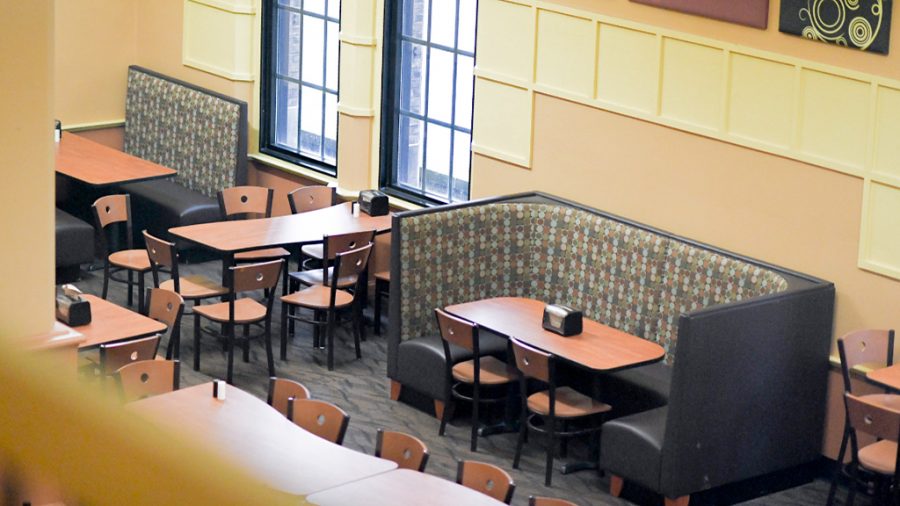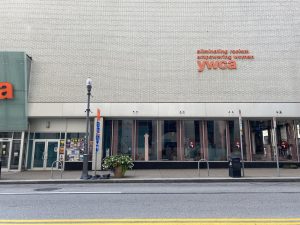Students speak out about return to campus, in-person learning plans amid Omicron surge
University briefly suspends guest policy, elaborates on plans in several emails
January 12, 2022
On Monday, Jan. 10, students and staff returned to campus for the Spring 2022 semester amid record-breaking COVID-19 cases levels from the Omicron variant, with multiple alterations made to the university’s original January 3 announcement.
Point Park decided to start the spring semester with in-person learning, citing confidence in the community’s vaccination rate and the continued mask mandate for campus community members. However, some students have expressed doubt over the effectiveness of these measures with the prevalence of Omicron locally and nationally.
“Although I would prefer to be in person, I think it’s a lot safer to do at least the first two weeks online like other schools are doing and going back to campus does make me a little anxious,” Becca Velgich, a sophomore broadcast production and media management major, said. “I think that everyone wants things to return ‘back to normal.’ I think the difference is some people are ignorant, want to just say ‘screw COVID,’ ignore guidelines and what we can do to help return to ‘normal.’ Meanwhile, others want to work together by wearing masks, staying home and getting vaccinated to safely and slowly return to normal.”
On January 3, President Donald Green sent an email to the entire campus community announcing that many of the COVID-19 protocols that had been in place in the fall would continue and that spring classes would begin in person. Green pointed to the guidance of local health officials and number of students vaccinated and said “along with the established effectiveness of our safety protocols throughout this pandemic, we believe we can safely and carefully return to campus as planned.”
Although the university is not requiring it, Green urged students to receive a booster dose of the COVID-19 vaccine and said a booster clinic would be set up on campus. As of Monday, Jan. 10, there has been no announcement about the date or location of that clinic.
There was also a link to the university’s Operations Manual for Returning to Campus, but fourth year cinema production major Joseph Chadwick quickly noticed on January 3 that the manual at that time had not been updated since September 8, 2021, well before the Omicron variant was discovered.
“Looking just on the title page, where there’s the ‘Version 17, September 8,’ [footnote] it’s clear that, you know, at the very least there hasn’t been an update to these guidelines in almost four months,” Chadwick said in an interview on Wednesday, Jan. 5 . “That is ridiculous considering the strain.”
Chadwick sent a reply to Green’s email on January 3, saying in it “I understand that our campus has a strongly vaccinated population, and I am not (necessarily) pushing for remote learning, however I feel absolutely anxious about returning to campus given the increased virality of the Omicron strain and the ‘business as usual’ content of the letter.”
Chadwick voiced his frustrations publicly on social media, drawing attention to the outdated manual on January 3. Within a few hours, Chadwick said he was told by the Executive Assistant to the President that his concerns had been passed along to Keith Paylo, the Dean of Students.
On January 4, Paylo wrote to all students, elaborating that the university would now be “limiting” large in-person events, offering testing for students with COVID-19 symptoms and would be hosting a COVID-19 testing clinic on Sunday, Jan. 9 at the Student Center Parking Lot in an effort to mitigate the virus’ spread; however, this was later moved to the Student Center gym due to inclement weather.
Just like last semester, COVID-19 testing was not required for all students before returning to campus, as had been the case at the start of the Spring 2021 semester. Lou Corsaro, Managing Director of University Marketing and Public Relations explained the reasoning behind this decision.
“When we were preparing for the start of the Spring 2021 semester, students were not yet vaccinated,” Corsaro said. “Our vaccination rate among students is now well north of 90 percent. We still strongly encouraged students to get tested prior to the start of this semester and made free testing available to all students, faculty and staff before the semester began.”
Corsaro also confirmed that the quarantine and isolation requirements for non-symptomatic students has been reduced to 5 days following the recent CDC recommendation, and that testing on campus will continue to only be available for symptomatic students.
On January 5, Point Park updated its manual to Version 18, with changes in red text to make them easier to identify. Notable changes beyond the updated CDC recommendations to the manual included extensive policies for the cinema and dance departments, detailing the specific circumstances performers and film crews had to be wearing masks, and general guidelines on how to socially isolate and respond to COVID-19 exposures.
Abby MacKay, a theatre production design major, supports starting the semester with remote learning.
“If we go remote, I feel there will be backlash about deadlines that need to be met for each of our upcoming shows. While I’m definitely worried that my show will be canceled because of COVID, I don’t think that constitutes risking the safety of the students,” MacKay said. “I definitely am aware that this is probably not the sole reason for their decision, but I do think it plays a part. I’m honestly not aware that there was new administration outside of my own department, but it is sad that they can’t think to at least have all of the students remote and quarantine the first two weeks of school, be remote, and have them test before coming back to campus.”
Beyond the Operations Manual, the university’s guest policy has also been altered, per an email sent by the Office of Student Life on January 5 to resident students.
“We hope that you have had a safe and relaxing winter break,” the email said. “We look forward to having you back on campus in just a couple of days. Prior to your return, we wanted to update you on the guest policy. As we have done for the past couple of semesters, we are going to suspend the guest policy for the start of the semester.”
The guest policy for residential students means that people not part of the Point Park community and Point Park commuter students cannot visit on-campus student residences and the number of other residential students who can visit has been restricted.
Student Life has reverted the guest policy back to the more restricted one in place at the beginning of the Fall semester. The policy was changed on September 21, just under a month into the semester.
The recent Office of Student Life is hopeful that the same change can be made this semester in a similar timeframe, according to the January 5 email.
“It is our goal to provide everyone with a safe environment upon returning to campus. It is our hope to return to the normal guest policy by the end of the month. We will evaluate the campus climate after the first couple of weeks and provide you with an update at that time.”
Since winter break started in December of last year, the Omicron variant has become the increasingly dominant variation over other forms of the virus. On Dec. 18 2021, around the time students left for break, Omicron was estimated to be responsible for about 38% of COVID-19 cases in the United States, according to the CDC’s COVID Data Tracker. As of Jan. 1, 2022, it has increased to over 95%. Additionally, the CDC states that the last 30 days have seen over 834,000 COVID deaths and 59.5 million infections.
Local universities and higher education institutions have also all implemented varying precautionary measures in response to the Omicron variant. Duquesne University, the University of Pittsburgh, Carlow University, Chatham University and Carnegie Mellon University are all either offering or mandating remote classes for at least the first week of classes, with Pitt and CMU’s remote courses lasting through the end of January. Additionally, CMU is requiring that their entire campus community receive the COVID-19 booster dose.
Despite the Point Park’s new and returning policies, some students are still not entirely comfortable with exactly how the university has handled the return to campus.
“I think that from the earliest stages of dealing with COVID, the school has sort of lacked any transparency with exactly what they’re going to be doing in terms of guidelines and such,” Chadwick said. “And when they do, it seems to be sort of, in my opinion, reactionary and based on the other schools’ guidelines.”



















